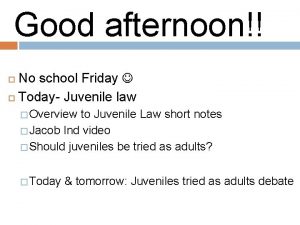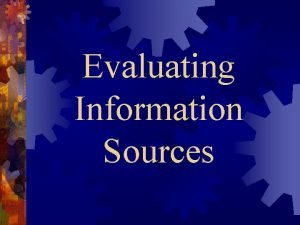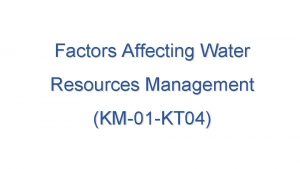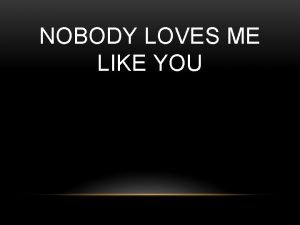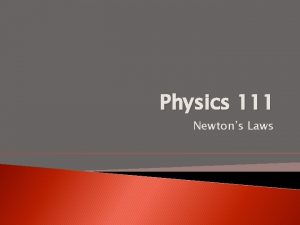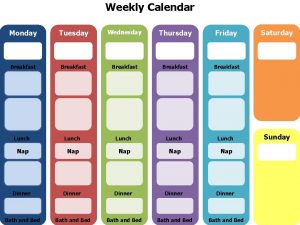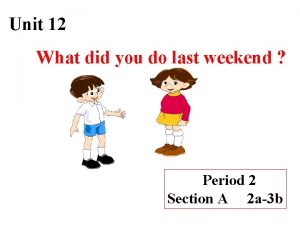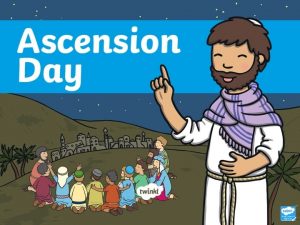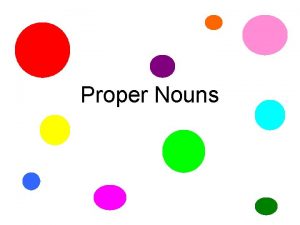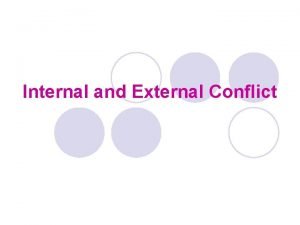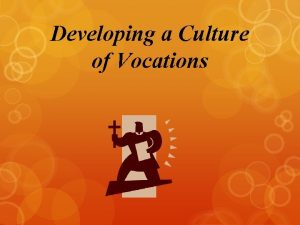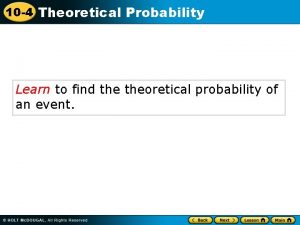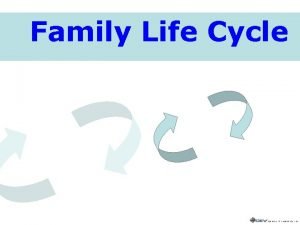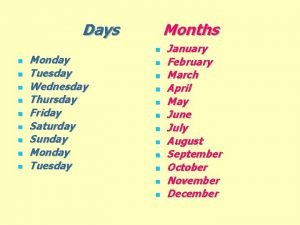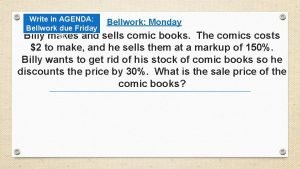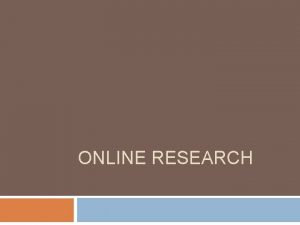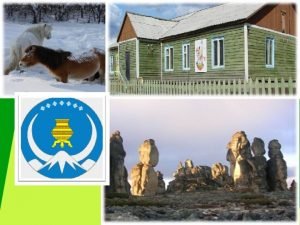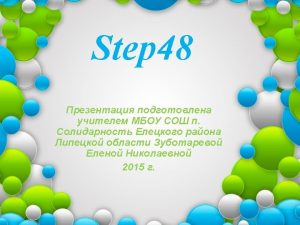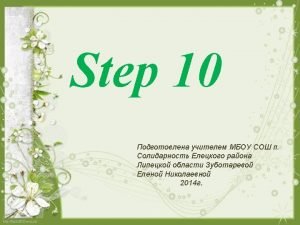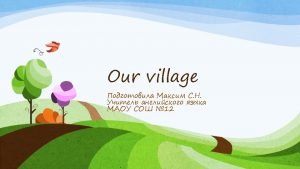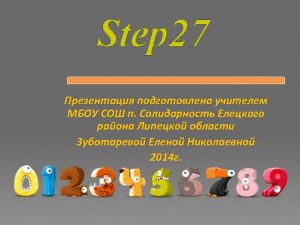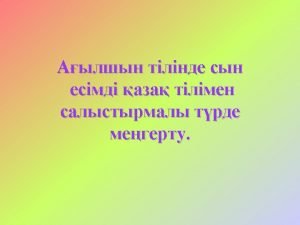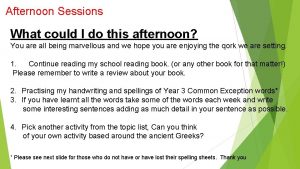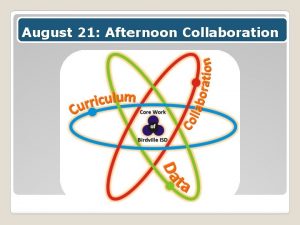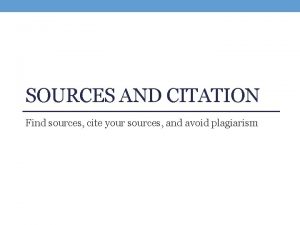GATHERING ONLINE SOURCES Friday Morning and Afternoon GATHERING







































- Slides: 39

GATHERING ONLINE SOURCES Friday Morning and Afternoon

GATHERING SOURCES ONLINE OUTLINE Beginning an online search Reading an online address Using keyword and Boolean expression Using RSS Searching for articles in journals and magazines Searching for articles in newspapers and media

CLEAR TARGETS OF THIS CLASS Digital sources are now a major source of research information The Internet makes available millions of computer files relating to any subject – articles, illustrations, sound and video clips, and raw data. This chapter provide direction for online searches: -- searching for viable academic information on the Web. -- accessing online sources -- evaluating and filtering the complex web of Internet sites.

INTRODUCTION-CORRECT THE MISTAKES The internet can’t replace the reference found in library or field research, they offered the best and worse informations, and require carefully evaluate. When read a Internet article, always takes time to judges its authority and veracity. Most Internet site meet basics academia standard, and you should keep in minds that the best scholar articles is find through the library data. With online sources, you had to filter personally opinion pieces that contains unsubstantial information.

INTRODUCTION Although the Internet cannot replace the references found in library or field research, it offers the best and worst information, and requires careful evaluation. When reading an Internet article, you should always take time to judge its authority and veracity. Most Internet sites meet basic academic standards, yet you should keep in mind that the best scholarly articles are found through the library databases. With online sources, you must filter personal opinion pieces that contain unsubstantial information.

BEGINNING AN ONLINE SEARCH Use search engine: Google, yahoo!, Ask, Bing, or Baidu. At the search window type in your key term Refine your search: enter your key words with “+” E. g. financial + crisis Try to get to the domain such as: . org, . gov, . net, and. edu. Avoid. com p. s. The usage of “and”.

CHECKLIST FOR EVALUATING ONLINE SOURCES (10 CHECK POINTS) Other than the common sense judgment, here a few guidelines: 1) prefer. edu and. org sites. University and professional organizations 2) the. gov and. mil (military) sites are generally considered to be reliable 3) the. com (commercial) sites are generally developed by for-profit organizations. Use them with caution unless you can verify their reliability 4) Look for professional affiliation of the writer. Search up the author to verify the reliability

CHECKLIST FOR EVALUATING ONLINE SOURCES 5) Look for bibliography that accompanies the article, which will indicate the scholarly nature of this writer’s work 6) Usenet discuss groups offer valuable information at times, but some articles lack sound, fundamental reasoning, or evidence to support the opinions. 7) Look for the timeliness of the information on the site. Check dates of publication and how often the information is updated. 8) Treat e-mail messages as mail, not scholarly articles, similar rule applies to chat

CHECKLIST FOR EVALUATING ONLINE SOURCES 9) Check whether the site contains hypertext links to other professional sites or to commercial sites. -- more reliable if link to other professional sites -- attempt to sell you something if link to commercial sites 10) Learn to distinguish from among the different types of websites, such as advocacy pages, personal home pages, informational pages, and business and marketing pages.

READING AN ONLINE ADDRESS The protocol (http: //) transits data The server (www, for world wide web) is the global Internet service that connects the multitude of computers and the Internet files The domain (pearsonhighered. com) names the organization feeding information in the sever with a suffix to label the types of organization, e. g. . gov, . com, , org, etc. The directory/file finds one of the server’s directories and then a specific file HTML, XHTML or XML are the markup languages used to write the file. -- HTML: hypertext markup language

USING KEY WORD AND BOOLEAN EXPRESSION Enter words or phrase to the search bar Use search engine’s advance or custom search tool to narrow your results Use Boolean expressions or Boolean operators with key words -- Boolean search expressions: -- AND or the “+” sign -- NOT or the “-” sign -- OR -- quotation marks “ ” contain exact phrase Wildcard searches * or ? E. g. diet* result: diet, diets, dietary, dietician, dietetics Ne? t, results: next, nest, neat

META SEARCH ENGINES A metasearch examines your topic in several of the search engines, such as Bing, Alta. Vista, Google, Go and Hotbot. E. g. www. mamma. com It can provide you with a more focused list of sites The meta search engine selects the first few listings from each of the other engines under theory that each engine puts the most relevant sites at the top of the list Suggested metasearch engines: Dogpile, Mamma, Metacrawler, or Surfwax

EDUCATION SEARCH ENGINES Educational search engines provide subject indexes for the various disciplines and for subtopics under those headings. English Server Iseek Internet Public library ERIC Library of congress Intute Discovery channel Voice of the Shuttle Pro. Quest K-12 Scirus Other useful ones: bizweb. com, BUBL link, Internet Scout

USING RSS: RICH SITE SUMMARY RSS feed: you can use RSS to set up a document called a Web feed using software known as a reader. There are many free online readers: Google reader, CNET, and Bloglines. These readers allow you to “subscribe” from all of those sites on one Web page. Look for the orange symbol to subscribe.

PIC

SEARCHING ARTICLES IN JOURNALS AND MAGAZINES The Internet helps you find articles in online journals and magazines. Most of the journals now have online presentation. The best source for academic journals is your library’s database collection. Access online journals: -- access your favorite search engine, use key word search for “journal” plus the name of your subject -- e. g. “journal + financial + crisis” -- or if you know the journal’s name, type in the name directly

ONLINE MAGAZINES You can access the magazine directory through: The Atlantic, Harper’s, or Newsweek Pathfinder gives you free access to several popular online magazines, such as Times, People, and Fortune. ZD Net: provides excellent access to industry-oriented articles in banking, electronics, computers, management, etc. (two weeks free access)

SEARCHING FOR ARTICLES IN NEWSPAPERS AND MEDIA SOURCES To find most any newspaper in the U. S. , consult usnpl. com This site takes you to the Aspen Times or the Carbondale Valley Journal or one of 800 -plus other newspapers The Chronicles of Higher Education presents news, information, and current issues in education. CNN interactive maintains a good search engine that takes you to transcripts of its broadcasts.

SEARCHING FOR ARTICLES IN NEWSPAPERS AND MEDIA SOURCES The New York Times is the largest metropolitan newspaper in the U. S. , with local and international content. USA today has a fast search engine that provides information about current events. Wall Street Journal is a business-oriented site has excellent information, but need to subscribe. The Washington Times provides up-to-the-minute political news.

PROOF READ EXERCISE Get to know field research in depth Read, revise, and understand the field research

WORK ON A PROOF READING AGAIN The human species is distinguished by its ability to examine the world systematically and to create pioneers for the millennium, such as computer technicians, mircrosurgeons, and nuclear engineers. Through field research you may become one of them. Field research refers to any studies conducted outside the library, such as digging at an archeology site, observing student behavior at a parking lot, or surveying a selected group with a questionnaire. This type of work may provide valuable information, and you should consider it as a worthy ingredient in your research plans.

You should set up your field research in an objective manner in order to control subject feelings. Although you may have strong personal feelings about your topic, you should look objectively for viable evidence. What are the facts? What conclusions do they support? You need to conduct the test, and then discuss the implications. Things you can do are: Interviewing knowledgeable people Writing letters and corresponding by e-mail Reading personal papers Attending lectures and public addresses

CONDUCTING A SURVEY WITH A QUESTIONNAIRE Questionnaire can produce current, firsthand data you can tabulate and analyze. To achieve meaningful results, you must survey a random sample – that is, each one must represent the whole population in terms of age, sex, race, education, income, residence, and other factors. Various degree of bias can creep into the questionnaire unless you remain objective. Popular online survey sites include Zoomerang, Survey. Monkey, Kwik. Surveys, and Question. Pro.

CONDUCTING EXPERIMENTS Empirical research, usually performed in a laboratory, can determine why and how things exist, function, or interact. Your paper will explain your methods and findings in pursuit of a hypothesis. An experiment thereby becomes primary evidence of your paper. A hypothesis is a statement assumed to be true for the purpose of the investigation. Your job is to prove its validity. Generally, a report on an experiment or observation follows an expected format featuring four distinct parts: introduction, method, results, and discussion.

READING AND EVALUATING SOURCES

TARGETS: Questions: How do I find and evaluate the best, most appropriate sources? How can I evaluate a source by analyzing its parts or just part of a source? How do I respond to the source information? One answer: Be skeptical and cautious.

OUTLINE Finding reliable sources Selecting a mix of primary and secondary sources Responding to the sources: Evaluating, outlining and summarizing a source Preparing an annotated bibliography or review of literature

FINDING RELIABLE SOURCES Several sources: -- instructor -- librarians (do you have one in China? ) -- the library -- the date: try to use recent ones -- choice (Pyramid chart)

SOURCE: WRITING RESEARCH PAPERS BY LESTER & LESTER 2015

FOR ACADEMIC JOURNALS How to judge whether the paper is good or not? -- where it has been published? -- its citation history -- the reputation of the author

SELECTING A MIX OF PRIMARY AND SECONDARY SOURCES Primary sources: - novels, speeches, eyewitness accounts, interviews, letters, autobiographies, and the results of original research - feel free to quote often with a primary source if it has direct relevance to your discussion Secondary source: -writings about the primary sources, about the author, or about somebody’s accomplishment. E. g. report on presidential speech, report on a poll results, review of new scientific findings, etc. - do NOT quote liberally from secondary source, be selective!

SOURCE: WRITING RESEARCH PAPERS BY LESTER & LESTER Primary Secondary

RESPONDING TO THE SOURCES (1) Evaluating a journal article Look at the source carefully: - The title: look for words that have relevance to your topic - An abstract: reading abstract is the best way to ascertain if the essay or book will serve your writing - The opening paragraphs: see whethere is relevance, if not, abandon it. - The topic sentences: to grasp the main point (whole paper) -The closing paragraphs: if the opening looks good, skim the closing for relevance - Author credits: learn the authors’ credentials

RESPONDING TO THE SOURCES (2) Outlining a source -- you can frame an outline to capture an author’s primary themes -- the outline provides you an overview of the article with issues clearly labeled. Summarizing a source -- condense the article into a brief note -- writing a summary force you to grasp the essence of the material -- the summary can serve as the heart of an annotated bibliography

PREPARING A REVIEW OF LITERATURE Literature review: -- presents a set of summaries in essay form for 2 purposes A: helps you investigate the topic because it forces you to examine and then describe how each source addresses the problem B: It organizes and classifies the sources in some reasonable manner for the benefit of the readers -- You should relate each source to your central subject -- You should group the sources according to their support of your thesis

PREPARING AN ANNOTATED BIBLIOGRAPHY An annotation is a summary of the contents of a book or article A bibliography is a list of sources on a selected topic An annotated bibliography does 2 things: -- it gives a bibliographic list of a selection of sources -- it summarizes the contents of each book or article It looks like busy work, but it will pay off. There are 4 forms of annotated bibliographies:

SOURCE: WRITING RESEARCH PAPERS BY LESTER & LESTER

UNDERSTAND AVOIDING PLAGIARISM

OUTLINE Using source to enhance your credibility Placing your work in its proper context Understanding copyright Avoiding plagiarism Sharing credit in collaboration projects Honoring and crediting sources Seeking permission to publish material on your website
 Good afternoon morning
Good afternoon morning Good afternoon friday
Good afternoon friday Friday morning prayer
Friday morning prayer Snowman mad libs
Snowman mad libs Friday morning hello
Friday morning hello Good morning friends friday
Good morning friends friday Print sources of information
Print sources of information Importance of water management
Importance of water management Good morning
Good morning Hello teacher good afternoon
Hello teacher good afternoon Good morning afternoon evening
Good morning afternoon evening Nobody loves me poem
Nobody loves me poem Good morning class images
Good morning class images Brother john morning bells are ringing
Brother john morning bells are ringing How do you greet your teacher in the afternoon
How do you greet your teacher in the afternoon Good morning everyone or everybody
Good morning everyone or everybody Good morning nice to see you
Good morning nice to see you Responses good morning
Responses good morning Ethan is dragging a bag of grass
Ethan is dragging a bag of grass Unfortunately for vanessa the wheels on her suitcase
Unfortunately for vanessa the wheels on her suitcase Monday tuesday wednesday thursday friday calendar
Monday tuesday wednesday thursday friday calendar What did you do last week paragraph
What did you do last week paragraph Good friday timeline for jesus
Good friday timeline for jesus Proper noun store
Proper noun store Its friday but sundays coming
Its friday but sundays coming External conflict
External conflict Fluency friday
Fluency friday Friday bellwork
Friday bellwork Friday eve gif
Friday eve gif Sgt friday just the facts
Sgt friday just the facts Black friday essay topics
Black friday essay topics What is the theoretical probability of drawing friday
What is the theoretical probability of drawing friday What did your last weekend look like
What did your last weekend look like He ate through one apple
He ate through one apple Family life today
Family life today Nonfiction reading test black friday
Nonfiction reading test black friday Good friday edwin morgan annotated
Good friday edwin morgan annotated Monday tuesday wednesday thursday friday saturday sunday
Monday tuesday wednesday thursday friday saturday sunday What is a uniform probability model
What is a uniform probability model Black friday stock market crash
Black friday stock market crash

